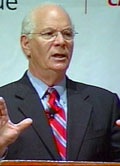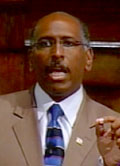1.
Should the U.S. withdraw troops from Iraq? If so, how soon?
Yes. Announce an immediate withdrawal and complete it within
four months. We should withdraw not just our military but also
our corporate interests. The
U.S. should withdraw as soon as the job is complete. The
situation is not good. And the candidate has called for a course
correction. He believes that the administration has to put firm
goals in place that call and demand the Iraqi government to
step up its role in government, in the military, and in
policing, so that the Iraqi government stands for itself.
Yes. On Iraq, he’s called on the president to bring forward a plan to bring our troops home now in a phased withdrawal. He voted against the war and has been critical of the president’s management of the war throughout the war.
2.
Do you support federal agencies’ funding and conducting
embryonic stem cell research to find cures to diseases?
Yes. [The candidate] fully supports expanding and increasing federal funding
for embryonic stem cell research. He voted to override the
president’s veto of the stem cell bill last session.
At the same time, [the candidate] says that the government
should not go overboard on funding for this because it is an
unproven area of medicine. He said it was important to
proceed cautiously so that the government is not throwing a
lot of money at this kind of research, which might make
corporations rich but might not result in finding any
cures.
Yes, as long as it does not destroy the embryo.
3. Should the federal government play a role in
making sure that every American has health care insurance?
If so, what should that role be? If not, why not?
Medicare part D prescription drug plan is a good first step, but it’s not a panacea. The candidate has called on the president to extend the deadline so more of our seniors can sign up for it.
Yes. He supports universal health care; he voted for the Clinton
plan. He tends to prefer an individual mandate model [such
as the Massachusetts Health Care Reform Plan signed into law in
April]; however, he is open to different models as long as
it gets us to universal care so every American has insurance.
Yes. It should be a national health care plan with a single payor system with the government paying, so it’s no longer a private insurance. (Essentially, it’s Medicare for all.)
4.
Do you support an increase in the minimum wage, which is now
$5.15 an hour? If so, by how much?
Yes.
[The candidate] has consistently voted to increase the minimum wage. He
believes it’s wrong that a person who works at minimum wage for
40 hours a week for 52 weeks a year with no vacation would still
be living in poverty. He voted for the House version of the
Kennedy bill. [That bill would provide for an increase of
the minimum wage to $5.85 an hour 60 days after the bill is
enacted, and to $6.55 an hour one year after that
60th day, with another increase to $7.25 an hour two
years after that 60th day.] Yes. I support a living wage, which is more than a minimum
wage. Depends on what part of part of the country you’re in. In Maryland, I would say it’s about $10.50 an hour for a living
wage. Yes.
[The candidate] is one of the few in the . . . party who supports this. He has said repeatedly that it is overdue.
He also supports incentives for small businesses to be able to meet an increase.
5.
Do you support legislation that would create a path to
citizenship for illegal immigrants by requiring them to meet
certain requirements, since there is no path that would
allow them to obtain citizenship now?
First and foremost, the U.S. must secure the border. The
candidate analogizes this to plugging a leak in a boat that has
sprung a leak before dealing with the water in the boat. He
does not support amnesty.
The economics trumps enforcement. We need to deal with the
underlying economics. Renegotiating NAFTA is a big part of
that.
Yes. [The candidate] supports the McCain-Kennedy legislation in the Senate and the formula for granting citizenship within that legislation. He’s opposed to amnesty (i.e. granting citizenship without penalty). He believes nobody should cut in line; if a person is an otherwise law-abiding member of society, he or she should be able to wait their turn and earn citizenship.
He supports comprehensive immigration reform starting with border security.
6. Do you support a Social Security reform plan
that lets individuals put some of their payroll tax
contributions for Social Security into private accounts? If
not, what should be done to keep the system solvent?
The system is solvent for 35 years. But [the candidate] believes that the
Social Security money should not be spent on other priorities. Social Security is not
in crisis.
The candidate looks at it through the eyes of two people. He
looks at it through the eyes of a 72-year-old grandmother. He
wants to ensure that the system remains solvent and guarantees
funds are in place for those in retirement. He also looks at it
through the eyes of his 18-year-old son and wants to make sure
that there’s flexibility in the system to make sure he will also
have Social Security benefits when he retires.
No. [The candidate] said the first thing is to stop borrowing from it. He said the federal government has borrowed 1.5 trillion from the Social Security trust fund. Second, he said to raise the salary cap from $92,500, so that all income earners pay their fair share so that Social Security remains solvent. For example, a CEO who earns $10 million annually pays the same as someone who earns $92,500 annually. If that cap were raised, the U.S. could not only make Social Security solvent, but could create an annuity for all Americans to retire and be secure beyond Social Security.
7. Do you support the Freedom of Choice Act (S.
2593) introduced in the Senate this April, which prohibits
government interference with a woman’s right to choose
whether to bear a child or have an abortion?
Yes. I see no hindrance to that. Choice should not even be an
issue addressed by the government; it’s up to the person.
The candidate is a pro-choice . . . and his voting record
reflects that.
The candidate is a pro-life Catholic.
Your match with Ben Cardin is: 



